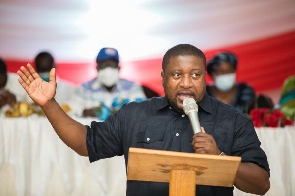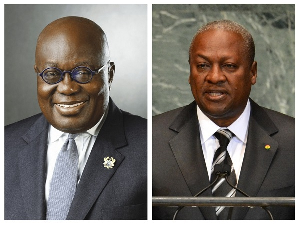 President Nana Addo Dankwa Akufo-Addo
President Nana Addo Dankwa Akufo-Addo
The President, Nana Addo Dankwa Akufo-Addo, has called on Ghanaians to stop downplaying the chronology of events that led to the eventual liberation of the country from colonial rule.
He has also noted the need to recognise the collective efforts of all who contributed in diverse ways towards gaining independence for the country.
The President has blamed the trivialisation of the history to unnecessary partisanship, urging that the time had come for the country to rise above political considerations and set the records straight.
“It is unfortunate that 62 years after independence, the history of these events continue to be embroiled in needless controversy, due, largely to partisan political considerations of the moment.
“It is time we rose above partisan considerations, set the records straight, recognise the collective efforts in gaining our freedom and independence from colonial rule, reject the trivialisation of our past, and do right by our history,” he remarked.
Addressing a commemorative event last Sunday to mark the first celebration of Founders’ Day, which has been slated for August 4 every year, President Akufo-Addo expressed gladness that “this day has now found root in our nation’s calendar by an Act of Parliament, and long may it so continue.”
He believed there could not have been any better way for the government to honour those who played a role than to commemorate the day on which the two most significant events on the nation’s colonial political history leading to freedom and independence, events which occurred on August 4.
At the ceremony last Sunday, which saw the attendance of the Vice President, Dr. Mahamudu Bawumia, the Chief of Staff, Frema Osei Opare, and other high profiled personalities, including former President Jerry John Rawlings, and senior citizens.
The Ghana Actors Guild staged a play on how some Ghanaians stood up to intellectually fight British rule which led to independence.
History indicates that by the beginning of the nineteenth century, a subtle change begun to take place in the role of Europeans on the Gold Coast, resulting from the growing coastal trade which led to the rise of new urban settlements near the walls of the various European built forts.
There existed a moral obligation for the Europeans to protect Africans who had lost their traditional means of protection against the depredations of outsiders, because they now resided along forts controlled by these Europeans, a development which drew the British merchants and the government into the mainstream politics of Gold Coast.
As a result of the changing trade pattern, two states, Fante and Ashanti, arose in the Gold Coast, where, hitherto, there had existed no indigenous states of comparable stature.
Whereas the Fantis enjoyed the lucrative position of middlemen in the prevailing system of trade routes, the Ashantis had, by the end of eighteenth century, secured control over the supply of slaves and gold to the coastal markets, and the distribution of the European imports.
Later, confrontations between Ashanti and the Fante contributed to the growth of British influence on the Gold Coast, as the Fante State, concerned about Ashanti activities on the coast, signed the Bond of 1844 at Fomena-Adansi that allowed the British to usurp judicial authority from the African courts.
Fast forward, on August 4, 1947, the United Gold Coast Convention (UGCC) was formed at Saltpond, as a social group of mostly merchants and educated elites, to spearhead social agitations for independence, with a slogan, “Self-Government within the shortest possible time.”
The Chairman of the party was George Grant, also known as Paa Grant, who was the financier of the party. Other leading members included Ernest Ako Adjei, Edward Akufo-Addo, Emmanuel Obetsebi Lamptey, William Ofori-Atta, and Dr. Joseph Boakye Danquah.
With time, Ako Adjei proposed the employment of an energetic young man he had met in England, Kwame Nkrumah, as General Secretary of the party.
Upon returning to Gold Coast at the end of 1947, Nkrumah was able to devote his full attention to mobilising support across the country for the cause, which later gave Ghana independence.
- Driver, spokespersons: The 3 close aides of Akufo-Addo aiming to enter Parliament
- Crash of newly-imported train: 4 more people remanded
- You still have the nerves to speak like this – Randy Abbey slams Danquah Institute
- Crash of newly-imported train: Owner of Hyundai truck speaks
- Watch video of crash between newly-imported train and parked Hyundai truck
- Read all related articles










